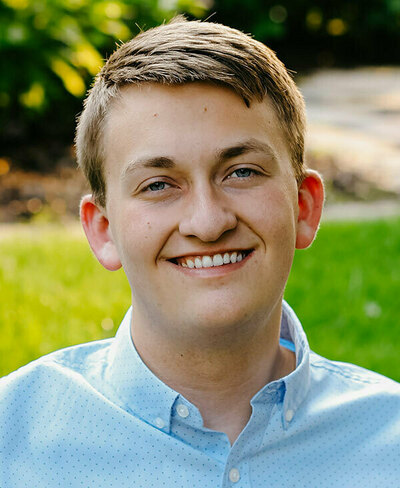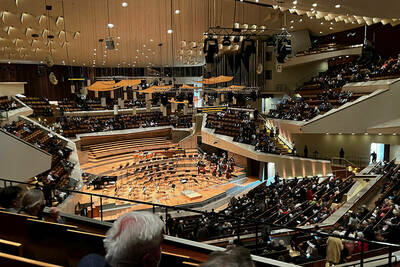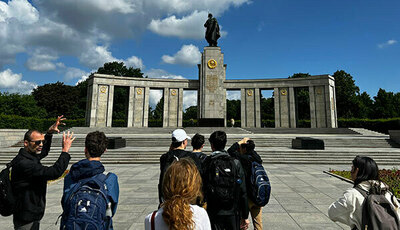
Junior Nick Huls gained knowledge, confidence, and perspective taking part in the six-week Summer in Berlin Program offered by the Department of German and Russian Languages and Literatures, which resumed operation in 2022 after being halted for two years due to COVID-19. In addition to taking two courses, the economics major enjoyed traveling; attending plays, concerts, and art exhibits; and sampling food from across the region.
“These experiences re-energized my academic pursuits. No matter how much you think you know or how many places you go, there are always more perspectives to be appreciated,” said Huls, who is also minoring in accountancy and the Hesburgh Program in Public Service and is a part of the Glynn Family Honors Program.
This fall, he’s continued his international experiences by studying in London, where he’s taking courses for his College and University requirements. He’s also begun work on his senior thesis, with support from the Kennedy Scholars Seminar at the London Global Gateway. He plans to research how Election Day discounts given by rideshare companies impacted voter turnout.
Why did you study abroad in Berlin?
I chose to study in Berlin for two reasons. First, both classes seemed very interesting. On a more personal note, my family's best-traced genealogy goes back to Germany, with my maternal grandmother’s family going back to the Schleswig-Holstein area.
Before going to Berlin, could you understand and converse in German?
I satisfied my language requirement in Spanish in the College of Arts & Letters. I spoke almost no German before I left; I took a couple Duolingo modules but not enough to be functional. When we arrived, we were introduced to a number of helpful phrases and, over time, I picked up other bits and pieces.

What classes and excursions did you take?
The first class was an economics elective focused on competition policy in the European Union, with comparisons to the United States. It involved discussions of theory on market construction and competition, analysis of various case studies, and site visits to meet with economists in academia and government. My second class was focused on German politics, history and culture, from 1945 and 1950. It examined differences between East and West Germany, which involved looking at art and architecture, visiting historical sites, and engaging in other immersive activities throughout the city and country. It was special to see what life was like on the other side of the Cold War and how the vestiges of that system still influence modern discussions.
For both classes, we took excursions around Berlin. We also had weekend trips to Cologne and Bonn, then to Leipzig and Halle. The trips were enlightening because Berlin is unique in the way it existed during the divide, but going to the other areas helped illuminate what the East and West were like and how their paths were impacted by the division.
How did the program help grow your language and cultural engagement skills?
Immersing yourself in the culture and opening yourself up to small opportunities is a great way to gain nuggets of different cultures and build on your academic base. Study abroad can be focused on this idea of “discounted travel” and trying to see as much as possible within the limited time you're across the ocean. But if I had to give advice, it would be to resist this mentality. Some of my most exciting times came from stepping out of my comfort zone and exploring locally.
When I first got to Berlin, I was worried about my lack of German language skills and the culture shock, and it was easy to want to be reserved and stick to my comfort areas. Yet, the more I got out, the more confidence I had. Toward the end, when I visited the Neue Nationalgalerie, I stumbled through my limited language skills to get a ticket with the student discount. Though the interaction was far from polished, the sense of empowerment I felt was priceless.
“No matter how much you think you know or how many places you go, there are always more perspectives to be appreciated. And the more we access them, the better thinkers we become. I want to find opportunities to return to this fantastic city.”
Did the experience change you, your perspectives, or your academic path?
This program has given me a lot of confidence and self-sufficiency. Studying abroad lets you take a few steps farther out on the tightrope of “independent adulthood,” but there is still a great support system in place to catch you if you fall.
These experiences re-energized my academic pursuits. No matter how much you think you know or how many places you go, there are always more perspectives to be appreciated. And the more we access them, the better thinkers we become. I want to find opportunities to return to this fantastic city.

What do you tell friends considering the program?
Take the leap! There are so many things pulling at your time and attention over the summer. It can be scary to commit to a program in a country with a language that isn't familiar to you. And Berlin might not come to mind as the first place to visit in Europe. But this is such a special place and program. There are many gems to be found and things for everyone to do in the city. Once there, your fears will fade away quickly and you will be glad you took that leap of faith.
What's next?
Next summer, I'll intern with the Federal Deposit Insurance Corporation. I'm looking forward to being back on campus in January for the first time since May. Studying abroad is wonderful and has given me new appreciation for new places. But it's also shown me the things that I really cherish about Notre Dame. This opportunity — like many others — reminds me of how fortunate I am to go to school here.
Originally published by at al.nd.edu on December 09, 2022.